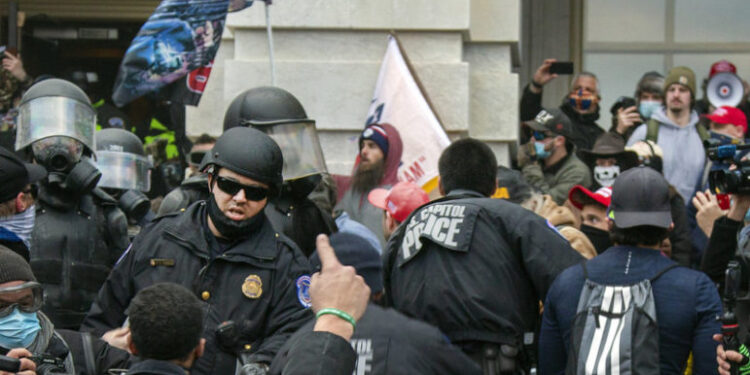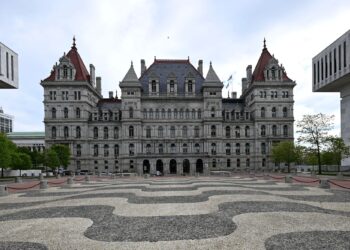Civil rights lawyer and scholar, Sherrilyn Ifill, recently wrote a didactic essay for The New York Review entitled “How America Ends and Begins Again: Because so much of what we have come to expect of our country is unraveling, we have an opportunity to build it a new.” Ifill addresses what is at stake or at risk should the insurrectionist-in-chief be re-elected to another term as POTUS.
As I have similarly written recently, a Donald Trump victory next fall would portend the end of American Democracy as we have known it for some 250 years and the instigation of a new illiberal democracy or autocracy.
As Ifill, the former President and Director-Counsel of the NAACP Defense and Education Fund from 2013 to 2022, articulates, “something monumental has happened to our country over the past ten years” where now “tens of millions of Americans are fully prepared to elect again as president a man of such degraded moral character, a man so void of a spirit of public service, a man so fundamentally inclined toward theft, mendacity, cruelty, and criminality that we can scarcely absorb the breadth of his transgressions.”
Ifill explains that while Trump, for example, “did not create racism,” he did unleash “a particularly virulent brand of it, giving millions of Americans permission to be their worst selves.”
Moreover, by “exhorting crowds” as far back as his 2016 campaign rallies against Hillary Clinton “to shout ‘Lock her up!’” and to promise “attendees that he would pay their legal fees if they would ‘knock the crap out’ of protesters,” Trump not only “normalized calls to violence in public spaces,” but he has also continued to stoke hate crime violence against vulnerable populations that is currently at its highest peaks since the Federal Bureau of Investigation began tracking these crimes in 1991.
Nevertheless, Ifill maintains if we can “make it out of this moment with the rudiments of our democracy still in place,” then “we will be facing an opportunity that we have not had in decades: a chance to build a truly healthy democracy.” She reasons that this has become possible “because the underbelly of our democracy has been exposed” and “because the compromises we have come to accept no longer work.”
As Ifill later alludes to, if the American voters can escape from Trumpism and defeat the broken and gerrymandered Republican party with all of their anti-democratic and autocratic tendencies, then the possibility, if not the necessity, exists for our transition from what has been the old tyranny of a democratic minority to what could become a new tyranny of a democratic majority as I argue in my forthcoming “Indicting the 45th President: Boss Trump, the GOP, and What We Can Do About the Threat to American Democracy.”
It goes without saying that should Trump defeat President Biden in 2024, we will not only have lost our old Democratic Republic as we know it, but the prospects for any kind of a new and improved democracy would be nothing more than a pipe dream because, under both an authoritarian dictatorship and Trumpian administration, democracy would be outlawed.
Even with the anti-democratic Electoral College favoring the Republicans, I do not think it is very likely that Trump will prevail on November 5, 2024. He will certainly lose the popular count by at least five million votes. I also think that any chances Trump may have for victory will shrink considerably once he is criminally convicted, whether or not he is sentenced to prison. In fact, according to Axios research suggests that if convicted as many as 52% of Republican voters would abandon him.
At this point in time, only the January 6 trial, even with the possibility of some delays, which has been scheduled to begin on March 4, 2024, in Washington, DC has a realistic chance of occurring before the November 2024 election. Fortunately for President Biden and the Democratic Party, this conviction will not occur at the earliest before two months after Trump has already wrapped up the Republican nomination on March 5 Super Tuesday.
Since the indictment of the United States vs. Donald J. Trump came down this past August, I have believed that this case would be a slam dunk for Special Counsel Jack Smith and his team of prosecutors, even with the remote possibility of jury nullification vis-à-vis a rogue Trumpist juror.
Up until Monday of this week I still believed that chances were slim that the US Supreme Court would take up a Trump appeal of an appellate court’s decision to affirm (but not deny) Judge Tanya Chutkan’s denial of Trump’s claims of presidential immunity. However, all bets are now off because Smith has asked the “Supreme Court to Decide Whether Trump Is Immune From Prosecution.”
The Special Counsel’s request was unusual because he not only asked the justices to rule before the appeals court, but he also urged them to move with exceptional speed because the “case presents a fundamental question at the heart of our democracy: whether a former president is absolutely immune from federal prosecution for crimes committed while in office or is constitutionally protected from federal prosecution when he has been impeached but not convicted before the criminal proceedings begin.”
At the same time, I am still concerned that Trump may be able to temporarily freeze the criminal procedures from moving forward, beginning as soon as after the first of the year should Trump succeed with this motion. Smith was obviously concerned by any delays as well because last Friday he filed a motion to prevent that from happening by separating the various procedures such as the mailing of questionnaires to prospective jurors and allowing for up to three weeks for jury selection which has been scheduled for one month before opening arguments are scheduled to begin on March 4.
Although, within hours of Smith’s request, SCOTUS responded by requiring Trump and his legal team to respond by December 20, SCOTUS could rule as soon as next month or February and not delay the March 4th starting trial date at all or only by a few weeks and still begin by the end of March, or worst-case scenario as late as the end of the 23/24 SCOTUS session in June and the trial then starting by late July and conviction before the election. Assuming that the Supreme Court will rule that Trump or any other president is not above the law, I predict an 8-1 ruling with Justice Clarence Thomas dissenting and not recusing himself as he should because of his wife’s involvement on January 6. That would allow the trial to begin by late July with a guilty verdict coming at least one month before the November 2024 presidential election.
Meanwhile, complying with the existing Court of Appeals limited gag order in his childish and yet effective narrative for the court of Republican opinion, the Projector-in-Chief’s spokesperson had the following to say:
“Crooked Joe Biden’s henchman, Deranged Jack Smith is so obsessed with interfering in the 2024 Presidential Election with the goal of preventing President Trump from retaking the Oval Office, as the President is poised to do, that Smith is willing to try for a Hail Mary by racing to the Supreme Court and attempting to bypass the appellate process.”
While I acknowledge that the prosecutors involved in all four of Trump’s criminal indictments as well as in his $250 million civil fraud case in Manhattan are all experts in their jurisdictional fields of endeavor, I also believe to the chagrin of many that Trump is more than a worthy adversary for any one of them – even with his terribly “self-delt” criminal hand.
What To Learn From the Recent Special Counsel Filing in the January 6 Saga?
As I explained last week in one of two Salon commentaries, behind Trump’s outlandish motions or court tactics there is a cunning strategy at work. Back in June I first wrote about Special Prosecutor Smith’s “speaking indictment and the stolen classified documents case. As I asserted, this indictment “hit Mar-a-Lago like a tsunami” and “a reckless criminal has finally met his match.”
The rest of this analysis focuses on the January 6 prosecution and the meaning of Jack Smith’s filing of his 404 (b) notice one week ago that advised the Court and Trump about other crimes and/or bad acts that will be used not as evidence of additional counts to be charged against the former president but for the important purposes of proving Trump’s motive, intent, and knowledge.
This distinction between the original charges and the additional evidence to be introduced by the prosecution revolves around “intrinsic” versus “extrinsic” evidentiary proofs and establishing in this case with the consultation of presiding Judge Chutkan the rules of the evidentiary road that will be followed and are important to both the prosecution and the bench in potentially vindicating them from any appeal filed by Trump for violating the due process notice of 404 (b).
If we thought we knew a lot about the case from the 2022 House Select Committee investigation of January 6 and/or from the unsealed four-count speaking indictment of Trump, now because of the filing of the 404 (b) notice we have a lot more knowledge of what Smith knows and how he intends on using it as part of winning legal strategy.
With respect to procedural due process, Smith is giving everyone involved in the case as well as the general public “extensive advance notice” of the evidence he will introduce at trial, including exhibits, witness lists, pre-trial motions, and a trial briefing of the evidence and issues that are likely to be brought up during the presentation of the government’s case. The substance of Smith’s notice specifically addresses six areas of evidence.
Briefly, these include:
- Historical Evidence of Trump’s Consistent Plan of Baselessly Claiming Election Fraud: To prove that Trump knew his claims were false, Smith will offer as evidence statements from Trump claiming that there would be fraud well before the election occurred in 2020. In fact, he plans to introduce statements from Trump claiming fraud in the 2016 election between him and Clinton as well as in the 2012 election between President Obama and Mitt Romney.
- Historical Evidence of Trump’s Plan to Refuse to Commit to a Peaceful Transition of Power: To prove that Trump planned to remain in power in the face of potential violence, Smith will introduce an exchange with a reporter where Trump says that “there won’t be a transition” in power between himself and Biden because “frankly, there’ll be a continuation. The ballots are out of control. You know it.”
- Evidence of Trump and his Unindicted Co-Conspirators’ Knowledge of the Unfavorable Election Results and Motive and Intent to Subvert Them: To prove that Trump knew he was losing at least in Michigan during the counting of the votes, Smith will provide evidence that Trump had knowledge involving an undisclosed (for now) agent of Trump’s and a campaign lawyer of his in Detroit that the votes on the ground were trending in Biden’s favor, and connecting the then president’s willingness in real time to unleash violence as a means of interfering with the vote counting in Detroit.
- Pre- and Post-Conspiracy Evidence Trump and his Co-Conspirators Suppressed Proof Their Claims Were False and Retaliated Against Officials Who Undermined Their Criminal Plans: To prove these points about the conspiracy to defraud, Smith will present evidence that Trump “repeatedly sidelined advisors and officials who told him and the public the truth about the results of the election.” And Trump and his co-conspirators also “continued their efforts to stifle any dissent to their false claims of election fraud” involving the Republican National Committee’s Chief Counsel who allegedly was retaliated against for refuting publicly the lies being told about the election fraud.
- Pre- and Post-Conspiracy Evidence of Trump’s Public Attacks on Individuals, Encouragement of Violence, and Knowledge of the Foreseeable Consequences: To prove these points, Smith is going to use Trump’s “established pattern of using public statements and social media posts” subjecting “his perceived adversaries to threats and harassment. The government will also introduce pre-conspiracy evidence that shows Trump encouraged violence, such as during one of the 2020 presidential debates where he told the Proud Boys to “stand back and stand by.” As for post-conspiracy evidence, Smith’s team will show how the promotion of violence continued well beyond the period in which Trump is charged, such as when Trump continued to attack two Georgia election workers even though he had been “on notice that his claims about them in 2020 were false and had subjected them to vile, racist, and violent threats and harassment.”
- Post-Conspiracy Evidence of Trump’s Steadfast Support and Endorsement of Rioters: To prove these points, Smith will introduce evidence that in the years since the January 6 attack on the Capitol, the “defendant has openly and proudly supported individuals who criminally participated in obstructing the congressional certification that day, including by suggesting that he will pardon them if re-elected.” Smith’s team will also introduce other evidence of Trump’s support for the “January 6 Choir” composed of inmates, including those convicted of crimes for assaulting the Capitol, as well as including a September 17, 2023, appearance on Meet the Press where Trump referring to the Proud Boys leader Enrique Tarrio who had been convicted of seditious conspiracy said: “I want to tell you, he and other people have been treated terribly” by the Department of Justice.
What this new information tells us about Smith’s prosecution of Trump for the January 6 obstruction of an official proceeding and conspiring to carry out the obstruction, the violation of civil rights, and the defrauding of government is that these four crimes had nothing to do with some kind of spontaneous protest gone violently astray or with some “inside job” deep state conspiracy as claimed by Vivek Ramaswamy at last week’s fourth Republican debate for the presidential nomination.
On the contrary, the refusal of President Trump to comply with the Presidential Transition Act of 1963 (Public Law 88-277) and to interfere with the certification of President-elect Joe Biden was and continues to be the product of a decade-long mission by the former president to undermine the legitimacy of the U.S. electoral system.
Lastly, not unlike the filing of the 404 (b) notice that is subject to the due process of law for the purpose of establishing the evidentiary rules of the road for the prosecution and the bench, the District of Columbia Court of Appeals’ ruling this past Friday balancing the constitutional rights of free speech and of a fair trial was also a matter of establishing the rules of the road for the defendant and his team of lawyers.
In its ruling, the court affirmed Judge Chutkan’s gag order to prohibit Trump from talking about witnesses relating to their testimony against him and from impugning court personnel and prosecutors carrying out their normal functions, but it exempted Judge Chutkan and Special Counsel Smith from Trump’s unfounded criticisms.
Gregg Barak is an emeritus professor of criminology and criminal justice at Eastern Michigan University and author of “Criminology on Trump.” His sequel “Indicting the 45th President: Boss Trump, the GOP, and What We Can Do About the Threat to American Democracy,” will be published April 1, 2024.



























